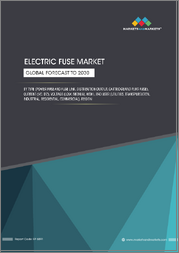
|
시장보고서
상품코드
1486416
전기 퓨즈 시장 규모 조사 : 유형별, 전압별, 최종 용도별, 지역별 예측(2022-2032년)Global Electric Fuse Market Size study, by Type, by Voltage, by End Use and Regional Forecasts 2022-2032 |
||||||
세계 전기 퓨즈 시장은 2023년 약 39억 2,000만 달러에 달했으며, 예측 기간인 2024년부터 2032년까지 5.80% 이상의 건전한 성장률로 성장할 것으로 예상됩니다.
전기 퓨즈는 과전류로부터 보호하고 회로 및 장비의 손상을 방지하는 전기 시스템의 중요한 구성요소로 작용합니다. 전류가 소정의 임계 값을 초과하면 퓨즈가 전류 흐름을 차단하여 회로를 보호합니다. 이 장치는 다양한 산업 및 주택에 널리 적용되어 전기 작동의 안전성과 신뢰성을 보장합니다. 퓨즈의 중요성과 기능을 이해하는 것은 효율적인 전기 시스템을 유지하고 전기적 위험의 위험을 줄이기 위해 필수적입니다. 업계 참여자들은 세계 전기 퓨즈 시장의 성장을 유지하기 위한 혁신적인 전략을 고안하기 위해 연구개발에 많은 자원을 투입하고 있습니다. 이러한 전략에는 제품 도입, 인수합병, 제휴, 파트너십, 기존 기술 강화 등이 포함됩니다.
저탄소 사회로의 전환과 지속가능성 목표 추구에 따른 다양한 산업의 전기화 진전은 전기 퓨즈 세계 시장 성장에 중요한 원동력이 되고 있습니다. 이러한 추진력은 특히 유럽과 북미와 같이 탄소 중립에 대한 정부의 적극적인 추진이 이뤄지고 있는 선진 지역에서 더욱 두드러지게 나타나고 있습니다. 또한, 기존 변전소 및 피더 라인 보호 시스템의 업그레이드는 계획된 발전 용량을 수용하고 노후화된 인프라를 교체해야 하기 때문에 시장 성장의 기회로 작용하고 있습니다. 그러나 신뢰성 및 자동화 기능이 강화된 MCB, MCCB, 릴레이 등의 대체품에 대한 수요가 증가함에 따라 시장 성장의 제약 요인으로 작용하고 있습니다. 또한, 전기 퓨즈 제조업체의 생산 계획에 영향을 미치는 규제 장벽과 승인 절차의 길이로 인해 전력망 확장 프로젝트가 지연되고 있습니다.
전기 퓨즈 세계 시장 조사에서 고려한 주요 지역은 아시아태평양, 북미, 유럽, 중남미 및 기타 지역이며, 2023년에는 아시아태평양이 가장 큰 시장 점유율을 차지했습니다. 이 지역은 중국, 일본, 인도 등의 국가로 구성되어 있으며, 특히 중국과 인도와 같은 신흥 경제국에서는 전력망에 대한 대규모 투자가 이루어지고 있습니다. 동남아시아에서는 석탄 발전이 크게 증가하여 전력 구성의 3분의 1을 석탄이 차지하고 있습니다. 이 지역의 배전 부문 개선은 개발도상국의 전기화율을 높이는 것을 목표로 하고 있습니다. 또한, 산업 부문의 성장은 전기 퓨즈에 대한 수요를 촉진하고 교통 인프라의 전기화 노력은 태양 에너지 소비에서 이 지역의 우위와 결합하여 아시아태평양의 전기 퓨즈 시장을 더욱 촉진하고 있습니다. 한편, 유럽 시장은 예측 기간인 2024년부터 2032년까지 가장 빠른 속도로 발전할 것으로 예상됩니다.
이 보고서에 포함된 주요 시장 기업
- Schneider Electric SE
- Siemens AG
- Mersen SA
- ABB Ltd
- Eaton Corporation plc
- Bel Fuse Inc
- Littelfuse Inc
- Legrand S.A.
- S&C Electric Company
- G&W Electric Co.
목차
제1장 세계의 전기 퓨즈 시장 정의와 조사 가정
- 조사 목적
- 시장 정의
- 조사 가정
- 포함 사항·제외 사항
- 제한사항
- 공급측 분석
- 입수 가능성
- 인프라
- 규제 환경
- 시장 경쟁
- 경제성(소비자의 관점)
- 수요측 분석
- 규제 프레임워크
- 기술 진보
- 친환경
- 소비자 의식과 수용
- 조사 방법
- 조사 대상 연도
- 통화 환산율
제2장 주요 요약
- 전기 퓨즈 세계 시장 규모와 예측(2022-2032년)
- 지역별 개요
- 부문별 개요
- 유형별
- 전압별
- 최종 용도별
- 주요 동향
- 경기후퇴의 영향
- 애널리스트의 결론과 제안
제3장 전기 퓨즈 세계 시장 역학
- 시장 성장 촉진요인
- 시장 과제
- 시장 기회
제4장 전기 퓨즈 세계 시장 산업 분석
- Porter's Five Forces 모델
- 공급 기업의 교섭력
- 구매자의 교섭력
- 신규 참여업체의 위협
- 대체품의 위협
- 경쟁 기업 간의 경쟁 관계
- Porter's Five Forces 모델로의 미래지향적 접근법
- Porter's Five Forces의 영향 분석
- PESTEL 분석
- 정치
- 경제
- 사회
- 기술
- 환경
- 법률
- 주요 투자 기회
- 주요 성공 전략
- 파괴적 동향
- 업계 전문가의 관점
- 애널리스트의 결론과 제안
제5장 전기 퓨즈 세계 시장 규모와 예측 : 유형별, 2022-2032년
- 전력 퓨즈 및 퓨즈 링크
- 배전 컷아웃
- 카트리지 퓨즈 및 플러그 퓨즈
- 기타
제6장 전기 퓨즈 세계 시장 규모와 예측 : 전압별, 2022-2032년
- 저전압
- 중전압
제7장 전기 퓨즈 세계 시장 규모와 예측 : 최종 용도별, 2022-2032년
- 주거용
- 상업용
- 산업용
- 유틸리티
- 수송
제8장 전기 퓨즈 세계 시장 규모와 예측 : 지역별, 2022-2032년
- 북미의 전기 퓨즈 시장
- 미국
- 유형 내역 규모와 예측, 2022-2032년
- 전압 내역 규모와 예측, 2022-2032년
- 최종 용도 내역 규모와 예측, 2022-2032년
- 캐나다의 전기 퓨즈 시장
- 미국
- 유럽의 전기 퓨즈 시장
- 영국의 전기 퓨즈 시장
- 독일의 전기 퓨즈 시장
- 프랑스의 전기 퓨즈 시장
- 스페인의 전기 퓨즈 시장
- 이탈리아의 전기 퓨즈 시장
- 기타 유럽의 전기 퓨즈 시장
- 아시아태평양 전기 퓨즈 시장
- 중국의 전기 퓨즈 시장
- 인도의 전기 퓨즈 시장
- 일본의 전기 퓨즈 시장
- 호주의 전기 퓨즈 시장
- 한국의 전기 퓨즈 시장
- 기타 아시아태평양의 전기 퓨즈 시장
- 라틴아메리카의 전기 퓨즈 시장
- 브라질의 전기 퓨즈 시장
- 멕시코의 전기 퓨즈 시장
- 기타 라틴아메리카의 전기 퓨즈 시장
- 중동 및 아프리카의 전기 퓨즈 시장
- 사우디아라비아의 전기 퓨즈 시장
- 남아프리카공화국의 전기 퓨즈 시장
- 기타 중동 및 아프리카의 전기 퓨즈 시장
제9장 경쟁 정보
- 주요 기업 SWOT 분석
- 주요 시장 전략
- 기업 개요
- Schneider Electric SE
- 주요 정보
- 개요
- 재무(데이터 가용성에 따라 다름)
- 제품 개요
- 시장 전략
- Siemens AG
- Mersen SA
- ABB Ltd
- Eaton Corporation plc
- Bel Fuse Inc.
- Littelfuse Inc
- Legrand S.A.
- S&C Electric Company
- G&W Electric Co.
- Schneider Electric SE
제10장 조사 과정
- 조사 과정
- 데이터 마이닝
- 분석
- 시장 추정
- 검증
- 출판
- 조사 속성
Global Electric Fuse Market is valued at approximately USD 3.92 billion in 2023 and is anticipated to grow with a healthy growth rate of more than 5.80% over the forecast period 2024-2032. Electric fuses serve as crucial components in electrical systems, safeguarding against overcurrent and preventing damage to circuits and equipment. When the current exceeds a predetermined threshold, the fuse interrupts the flow, protecting the circuit. These devices find widespread application in various industries and residential settings, ensuring safety and reliability in electrical operations. Understanding their importance and functionality is integral to maintaining efficient electrical systems and mitigating risks of electrical hazards. Industry participants are dedicating significant resources to research and development efforts aimed at devising innovative strategies to sustain growth in the Global Electric Fuse Market. These strategies encompass product introductions, mergers and acquisitions, collaborations, partnerships, and the enhancement of existing technologies.
The increasing electrification of various industries, driven by the transition to a low-carbon future and the pursuit of sustainability goals, presents a significant driver for the Global Electric Fuse Market. This driver is particularly pronounced in developed regions such as Europe and North America, where governments are actively promoting carbon-neutral initiatives. Moreover, the upgrading of existing substations and feeder line protection systems offers opportunities for market growth, given the need to accommodate planned power generation capacities and replace aging infrastructure. However, the market faces restraints due to the rising demand for substitutes such as MCBs, MCCBs, and relays, which offer enhanced reliability and automation capabilities. Additionally, challenges arise from delays in grid expansion projects, resulting from regulatory hurdles and lengthy approval processes, which impact production planning for electric fuse manufacturers.
The key regions considered for the Global Electric Fuse Market study includes Asia Pacific, North America, Europe, Latin America, and Rest of the World. In 2023, the Asia Pacific region is poised to hold the largest market share. The region, comprising countries such as China, Japan, India, and more, is witnessing substantial grid investments, particularly in developing economies such as China and India, driving demand for electrical and circuit protection equipment. Coal-based power generation in Southeast Asia has grown significantly, with coal comprising a third of the electricity mix. The region's improving distribution sector aims to enhance electrification rates in developing nations. Additionally, the industrial sector's growth drives demand for electric fuses, while electrification initiatives in transportation infrastructure, coupled with the region's prominence in solar energy consumption, further boost the Asia Pacific electric fuse market. The market in Europe, on the other hand, is expected to develop at the fastest rate during the forecast period 2024-2032.
Major market player included in this report are:
- Schneider Electric SE
- Siemens AG
- Mersen SA
- ABB Ltd
- Eaton Corporation plc
- Bel Fuse Inc
- Littelfuse Inc
- Legrand S.A.
- S&C Electric Company
- G&W Electric Co.
The detailed segments and sub-segment of the market are explained below:
By Type
- Power Fuse and Fuse Links
- Distribution Cutouts
- Cartridge and Plug Fuses
- Others
By Voltage
- Low Voltage
- Medium Voltage
By End Use
- Residential
- Commercial
- Industrial
- Utilities
- Transportation
By Region:
- North America
- U.S.
- Canada
- Europe
- UK
- Germany
- France
- Spain
- Italy
- ROE
- Asia Pacific
- China
- India
- Japan
- Australia
- South Korea
- RoAPAC
- Latin America
- Brazil
- Mexico
- Middle East & Africa
- Saudi Arabia
- South Africa
- RoMEA
Years considered for the study are as follows:
- Historical year - 2022
- Base year - 2023
- Forecast period - 2024 to 2032
Key Takeaways:
- Market Estimates & Forecast for 10 years from 2022 to 2032.
- Annualized revenues and regional level analysis for each market segment.
- Detailed analysis of geographical landscape with Country level analysis of major regions.
- Competitive landscape with information on major players in the market.
- Analysis of key business strategies and recommendations on future market approach.
- Analysis of competitive structure of the market.
- Demand side and supply side analysis of the market.
Table of Contents
Chapter 1.Global Electric Fuse Market Definition and Research Assumptions
- 1.1.Research Objective
- 1.2.Market Definition
- 1.3.Research Assumptions
- 1.3.1.Inclusion & Exclusion
- 1.3.2.Limitations
- 1.3.3.Supply Side Analysis
- 1.3.3.1.Availability
- 1.3.3.2.Infrastructure
- 1.3.3.3.Regulatory Environment
- 1.3.3.4.Market Competition
- 1.3.3.5.Economic Viability (Consumer's Perspective)
- 1.3.4.Demand Side Analysis
- 1.3.4.1.Regulatory frameworks
- 1.3.4.2.Technological Advancements
- 1.3.4.3.Environmental Considerations
- 1.3.4.4.Consumer Awareness & Acceptance
- 1.4.Estimation Methodology
- 1.5.Years Considered for the Study
- 1.6.Currency Conversion Rates
Chapter 2.Executive Summary
- 2.1.Global Electric Fuse Market Size & Forecast (2022- 2032)
- 2.2.Regional Summary
- 2.3.Segmental Summary
- 2.3.1.By Type
- 2.3.2.By Voltage
- 2.3.3.By End Use
- 2.4.Key Trends
- 2.5.Recession Impact
- 2.6.Analyst Recommendation & Conclusion
Chapter 3.Global Electric Fuse Market Dynamics
- 3.1.Market Drivers
- 3.2.Market Challenges
- 3.3.Market Opportunities
Chapter 4.Global Electric Fuse Market Industry Analysis
- 4.1.Porter's 5 Force Model
- 4.1.1.Bargaining Power of Suppliers
- 4.1.2.Bargaining Power of Buyers
- 4.1.3.Threat of New Entrants
- 4.1.4.Threat of Substitutes
- 4.1.5.Competitive Rivalry
- 4.1.6.Futuristic Approach to Porter's 5 Force Model
- 4.1.7.Porter's 5 Force Impact Analysis
- 4.2.PESTEL Analysis
- 4.2.1.Political
- 4.2.2.Economical
- 4.2.3.Social
- 4.2.4.Technological
- 4.2.5.Environmental
- 4.2.6.Legal
- 4.3.Top investment opportunity
- 4.4.Top winning strategies
- 4.5.Disruptive Trends
- 4.6.Industry Expert Perspective
- 4.7.Analyst Recommendation & Conclusion
Chapter 5.Global Electric Fuse Market Size & Forecasts by Type 2022-2032
- 5.1.Power Fuse and Fuse Links
- 5.2.Distribution Cutouts
- 5.3.Cartridge and Plug Fuses
- 5.4.Others
Chapter 6.Global Electric Fuse Market Size & Forecasts by Voltage 2022-2032
- 6.1.Low Voltage
- 6.2.Medium Voltage
Chapter 7.Global Electric Fuse Market Size & Forecasts by End Use 2022-2032
- 7.1.Residential
- 7.2.Commercial
- 7.3.Industrial
- 7.4.Utilities
- 7.5.Transportation
Chapter 8.Global Electric Fuse Market Size & Forecasts by Region 2022-2032
- 8.1.North America Electric Fuse Market
- 8.1.1.U.S. Electric Fuse Market
- 8.1.1.1. Type breakdown size & forecasts, 2022-2032
- 8.1.1.2.Voltage breakdown size & forecasts, 2022-2032
- 8.1.1.3.End Use breakdown size & forecasts, 2022-2032
- 8.1.2.Canada Electric Fuse Market
- 8.1.1.U.S. Electric Fuse Market
- 8.2.Europe Electric Fuse Market
- 8.2.1.U.K. Electric Fuse Market
- 8.2.2.Germany Electric Fuse Market
- 8.2.3.France Electric Fuse Market
- 8.2.4.Spain Electric Fuse Market
- 8.2.5.Italy Electric Fuse Market
- 8.2.6.Rest of Europe Electric Fuse Market
- 8.3.Asia-Pacific Electric Fuse Market
- 8.3.1.China Electric Fuse Market
- 8.3.2.India Electric Fuse Market
- 8.3.3.Japan Electric Fuse Market
- 8.3.4.Australia Electric Fuse Market
- 8.3.5.South Korea Electric Fuse Market
- 8.3.6.Rest of Asia Pacific Electric Fuse Market
- 8.4.Latin America Electric Fuse Market
- 8.4.1.Brazil Electric Fuse Market
- 8.4.2.Mexico Electric Fuse Market
- 8.4.3.Rest of Latin America Electric Fuse Market
- 8.5.Middle East & Africa Electric Fuse Market
- 8.5.1. Saudi Arabia Electric Fuse Market
- 8.5.2. South Africa Electric Fuse Market
- 8.5.3.Rest of Middle East & Africa Electric Fuse Market
Chapter 9.Competitive Intelligence
- 9.1.Key Company SWOT Analysis
- 9.2.Top Market Strategies
- 9.3.Company Profiles
- 9.3.1. Schneider Electric SE
- 9.3.1.1.Key Information
- 9.3.1.2.Overview
- 9.3.1.3.Financial (Subject to Data Availability)
- 9.3.1.4.Product Summary
- 9.3.1.5.Market Strategies
- 9.3.2. Siemens AG
- 9.3.3.Mersen SA
- 9.3.4.ABB Ltd
- 9.3.5.Eaton Corporation plc
- 9.3.6.Bel Fuse Inc.
- 9.3.7.Littelfuse Inc
- 9.3.8.Legrand S.A.
- 9.3.9.S&C Electric Company
- 9.3.10.G&W Electric Co.
- 9.3.1. Schneider Electric SE
Chapter 10.Research Process
- 10.1.Research Process
- 10.1.1.Data Mining
- 10.1.2.Analysis
- 10.1.3.Market Estimation
- 10.1.4.Validation
- 10.1.5.Publishing
- 10.2.Research Attributes



















